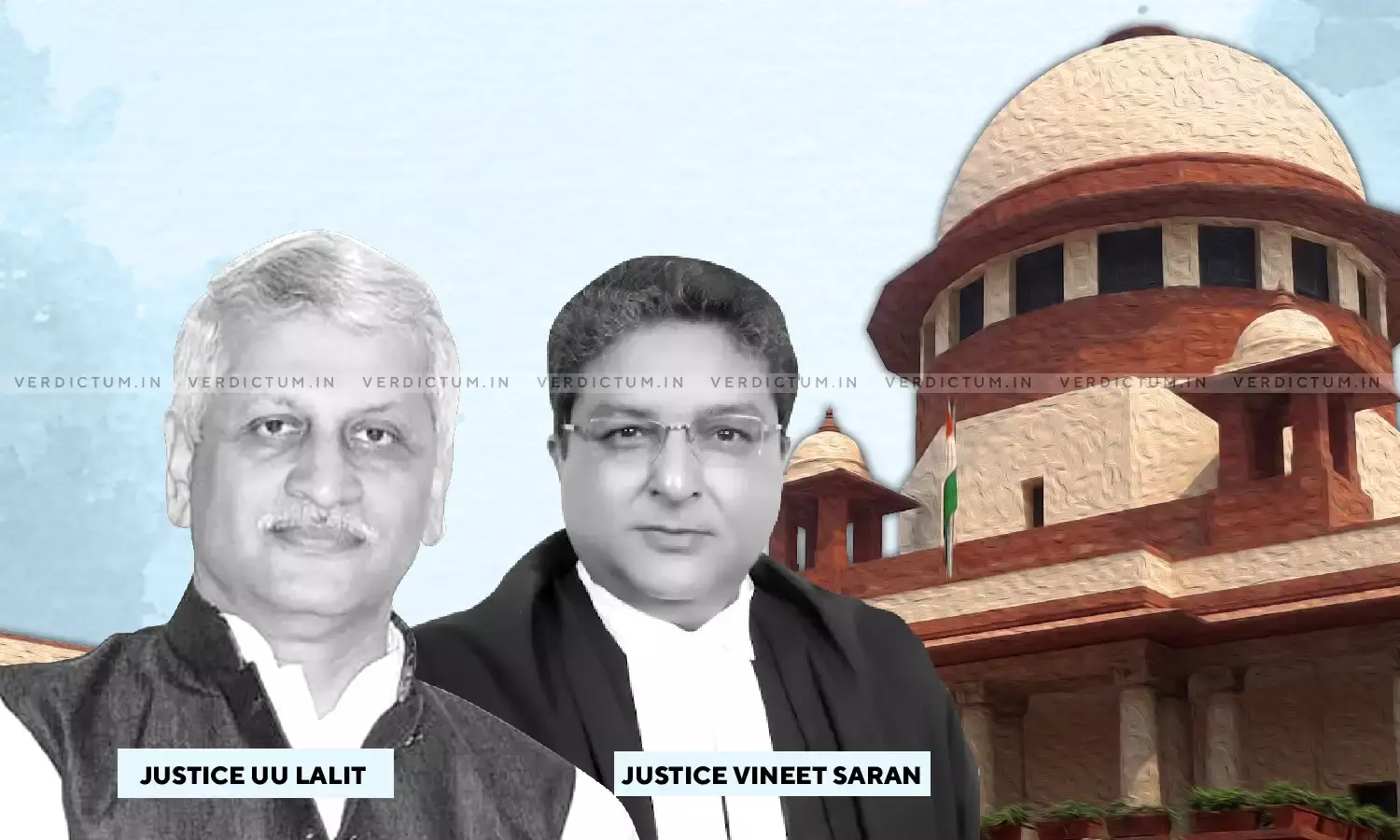Supreme Court Directs Reinstatement Of Judicial Officer Who Was Discharged From Service For Merely Passing Wrong Order
A two-judge Bench of Justice UU Lalit and Justice Vineet Saran has directed for reinstatement of a Judicial Officer Abhay Jain who was discharged from service after disciplinary proceedings were instituted against him for merely passing a wrong order.
The Court in this context held that mere negligence while passing an order cannot be treated as misconduct to terminate the services of a Judicial Officer.
The Bench also held that merely because a wrong order was passed by the Officer or the action taken by him could have been different, this did not warrant initiation of disciplinary proceedings against the Appellant – Judicial Officer.
Senior Counsel Mr. P.S. Patwalia appeared for the Appellant while Senior Counsel Mr. Vijay Hansaria appeared for the Respondent before the Apex Court.
In this case, Abhay Jain – Appellant had joined as a Judicial Officer In 2013. Thereafter, he was discharged from service in the year 2016. A complaint was filed alleging that the Appellant had passed a bail order with some ulterior or oblique motives and for extraneous considerations. The Full Court decided to discharge the Appellant and a discharge order was passed holding that the Appellant's services were unsatisfactory during the probation. Aggrieved, the Appellant approached the Rajasthan High Court, however, the High Court dismissed the Writ Petition of the Appellant.
Thereafter, the Appellant preferred an appeal before the Supreme Court.
The Appellant contended before the Apex Court that the charges against him were vague in nature and that absolutely no details were provided regarding the allegation of passing the bail order for extraneous considerations / ulterior motive.
The Apex Court held that the High Court erred in holding that the discharge order of the Appellant was a simpliciter order and not punitive in nature. In this context, the Bench further added –
"In spite of observing that the order of discharge had been passed on account of inquiry initiated against the appellant, the High Court failed to provide any reasoning as to how the allegation of misconduct pertaining to the bail order was not the foundation of the order of discharge."
The Court also noted that it was relevant to first assess whether the discharge was based upon the 'unsatisfactory performance' of the Appellant or whether it was based on the enquiry initiated against him.
The Bench while placing reliance on various precedents observed that the non-communication of the Annual Confidential Reports (ACRs) to the Appellant was arbitrary and violative of Article 14 of the Constitution.
"...Since the Government had, on enquiry, come to the conclusion, rightly or wrongly, that the appellant was unsuitable for the post he held on probation, this was clearly by way of punishment and, hence, the appellant would be entitled to the protection of Article 311(2) of the Constitution," the Court opined.
The Court accepted the contention of the Appellant that adverse comments in the ACR for the year 2015 could not have been the basis on which the Appellant was discharged from service.
The Bench also held that the Appellant was never granted an opportunity to improve and there was no intimation to him about his performance being unsatisfactory.
Placing reliance on Ishwar Chand Jain vs High Court of Punjab and Haryana [(1988) 3 SCC 370], the Bench held that every judicial officer is likely to commit mistake of some kind or in passing orders in the initial stage of his service, which a mature judicial officer would not. However, if the orders are passed without there being any corrupt motive, the same should be over-looked by the High Court and proper guidance should be provided to him. In this context, the Court held –
"In the present case, admittedly there was no intimation to appellant about his performance being unsatisfactory and hence he was deprived of his opportunity to improve as a judicial officer."
The Court further held, "We also find merit in the submission of the learned counsel of the appellant that the charges filed against the appellant are vague in nature and that absolutely no details have been provided regarding the said allegation of passing the bail order for extraneous considerations/ ulterior motive. In this context, there is no detail provided as to what was the said extraneous consideration or ulterior motive, but merely an inference has been drawn on the basis of suspicion. Further, the record reveals that no complaint or other material exists which could form the basis of the said allegations."
The Court also opined that the Appellant may have been guilty of negligence in the sense that he did not carefully go through the case file and did not take notice of the order of the High Court which was on his file. This negligence cannot be treated as misconduct.
The Bench held that there was not a string of continuous illegal orders that have been alleged to be passed for extraneous considerations.
"Any 'probability' of misconduct needs to be supported with oral or documentary material, and this requirement has not been fulfilled in the present case. These observations assume importance in light of the specific fact that there was no allegation of illegal gratification against the present appellant. As has been rightly held by this Court, such relief-oriented judicial approaches cannot by themselves be grounds to cast aspersions on the honesty and integrity of an officer," the Court noted.
In the light of these observations, the Court allowed the appeal and set aside the impugned judgment of the High Court and further directed for the reinstatement of the Judicial Officer with 50% back wages.
Click here to read/download the Judgment




